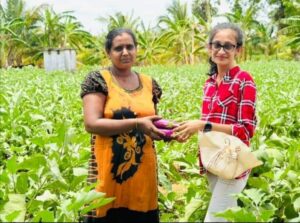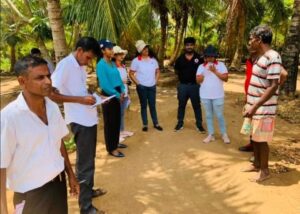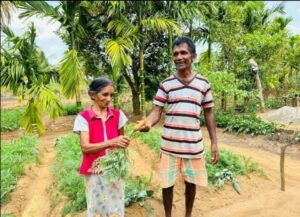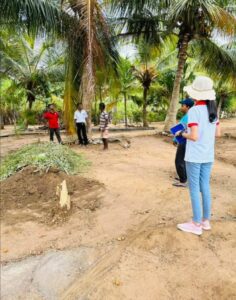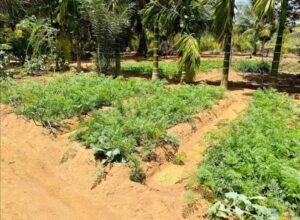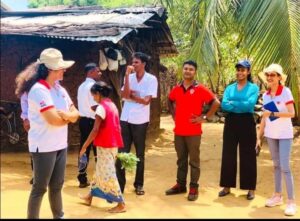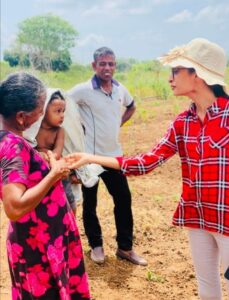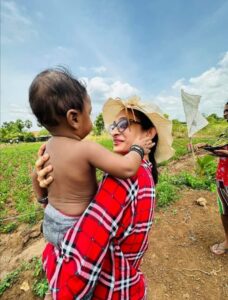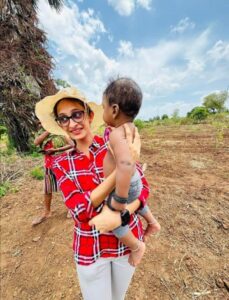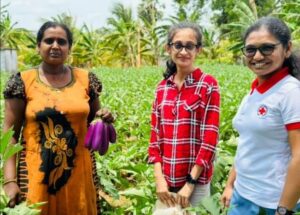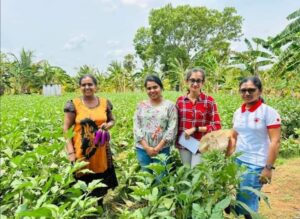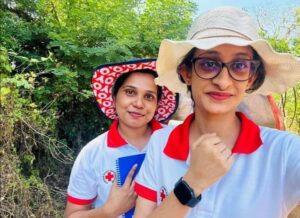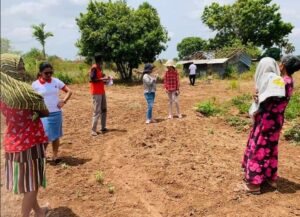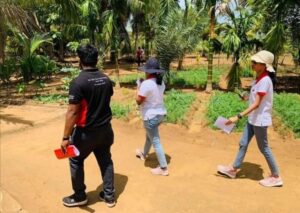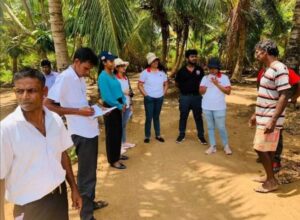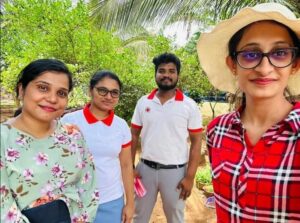Our Management Trainees’ Take Over: With Mithini
Stay in touch with our social media channels and website for future management trainee and internship opportunities.
Sri Lanka Red Cross Society supports people both within and outside the organisation. The Management Trainee and Internship programmes of the Sri Lanka Red Cross Society are a step above the typical training programmes that an undergraduate or recent graduate can pursue. The organisation is a powerhouse in developing future humanitarian professionals by providing them with hands-on experience in a variety of departments.
This is Mithini’s story with the Sri Lanka Red Cross Society, the country’s largest humanitarian network:
I’m Mithini Dissanayake, a 25-year-old recent graduate of the University of Kelaniya with a Bachelor of Arts (Honours) in Peace and Conflict Resolution. Currently, I’m embarking on an exciting journey as a management trainee at the National Headquarters of the Sri Lanka Red Cross Society, where I’m deeply committed to the humanitarian sector.
I’ve also been a professional violinist in Sri Lanka for the past 17 years. What began as a hobby has evolved into a lifelong passion, and you might recognise me as the ‘Violin Girl’ on social media platforms like TikTok, Facebook, and YouTube, where I share my musical talents and connect with a fantastic community of fellow music enthusiasts.
In addition to my love for music and dedication to humanitarian causes, I’m an entrepreneur involved in Facebook and YouTube advertising. This venture allows me to explore the dynamic world of online marketing and advertising, using digital platforms to reach a broader audience and promote causes dear to my heart.
You can find me on various social media platforms:
TikTok: Violin Girl
Facebook: Mithini Dissanayake
YouTube: Mithini Dissanayake
Feel free to join me on this journey, whether it’s for the love of music, the pursuit of peace, or exploring the entrepreneurial realm. Let’s connect, share, and collaborate to make a meaningful impact and appreciate the beauty of life’s diverse experiences.
This is my experience with the Sri Lanka Red Cross Society!
1. What encouraged you to apply for the position of management trainee at the Sri Lanka Red Cross Society?
I was strongly encouraged to apply for the position of management trainee at the Sri Lanka Red Cross Society due to my unwavering commitment to humanitarian work. This organisation’s longstanding history of providing essential assistance to those in need deeply resonates with my personal values. The opportunity to be a part of an organisation that plays such a vital role in alleviating suffering and promoting community resilience is not only inspiring but also perfectly aligns with my academic background in peace and conflict resolution.
Furthermore, my interest in the humanitarian sector has been a driving force in my career aspirations. This position provides a unique chance to gain hands-on experience, contribute to meaningful projects, and develop the skills necessary for making a real impact in the field. I believe that working as a management trainee at the Sri Lanka Red Cross Society will not only enrich my professional growth but also allow me to be part of a team dedicated to making a positive difference in the lives of those who need it most.
2. How has your experience as a management trainee at the Sri Lanka Red Cross Society been?
My experience as a management trainee at the Sri Lanka Red Cross Society has been both enriching and diverse, offering a comprehensive immersion into the field of humanitarian work. I’ve had the privilege of contributing to a variety of significant projects that encompassed various aspects of the organisation’s mission.
One of the pivotal projects I participated in was the International Federation of Red Cross and Red Crescent Societies (IFRC) Disaster Response Emergency Fund (DREF), which focused on addressing the challenges presented by extreme weather conditions. This initiative was instrumental in disaster preparedness and response, underscoring the organisation’s commitment to mitigating the impact of natural disasters.
In addition, the Emergency Appeal for Civil Unrest and the resulting Economic Crisis Project were another significant undertaking. In this capacity, I played a role in crafting a response plan designed to assist communities affected by civil unrest and economic instability. The ultimate aim was to support these communities in rebuilding their lives and restoring stability.
The Food Security-Based Livelihood Development Programme represented a key focal point of my work. This initiative aimed to foster long-term sustainability by aiding communities in developing their livelihoods and achieving food security, a cornerstone of community resilience. Moreover, I had the opportunity to contribute to the IFRC DREF project, which concentrated on mitigating the impact of dengue outbreaks and floods. This project had critical implications for public health and effective disaster management.
Conducting field visits to various Red Cross branches across Sri Lanka was a crucial aspect of my role. These visits, spanning locations like Vavuniya, Hambantota, Kalutara, Badulla, Nuwara Eliya, and Kandy, involved post-distribution monitoring to ensure that aid and resources reached their intended beneficiaries efficiently.
One of the most rewarding elements of my tenure was the opportunity to engage with a diverse array of communities, including the fisheries community, the LGBTQ community, and state workers. This extensive interaction provided me with a profound understanding of the unique needs and challenges faced by these distinct groups within Sri Lanka.
In sum, my time as a management trainee at the Sri Lanka Red Cross Society has significantly bolstered my skill set in project management and community engagement. Furthermore, it has deepened my commitment to humanitarian work, enabling me to make tangible contributions to the well-being of vulnerable communities and work towards a more resilient and compassionate society.
3. What did you take away from the programme, and how is it guiding your studies and career goals?
I have derived several valuable insights and experiences from my time as a management trainee at the Sri Lanka Red Cross Society that are profoundly influencing my studies and career goals.
First and foremost, the experience has reinforced the critical importance of humanitarian work and community engagement. It has shown me the tangible impact that such work can have on the lives of individuals and communities in need. This realisation has solidified my commitment to pursuing a career in the humanitarian sector, where I can continue to make a positive difference in people’s lives.
Furthermore, the programme has enhanced my project management skills, teaching me how to efficiently plan, execute, and monitor projects in a dynamic and often challenging environment. This knowledge and experience are directly applicable to my academic studies and future career endeavours, as they provide a strong foundation for effective project implementation and management.
My interactions with diverse communities, including the fisheries community, the LGBTQ community, and state workers, have expanded my understanding of the unique needs and challenges faced by different groups. This cultural sensitivity and empathy are invaluable not only for my academic pursuits but also for my future career in the humanitarian field, where effective communication and community-centred solutions are paramount.
In summary, my time as a management trainee at the Sri Lanka Red Cross Society has deepened my passion for humanitarian work, honed my project management skills, and fostered a greater understanding of the diverse communities I aim to serve. These takeaways are guiding my studies and career goals by motivating me to pursue advanced studies in humanitarian and development fields and to continue working in roles where I can contribute to the well-being of vulnerable communities and promote resilience, compassion, and positive change.
4. What are your most important takeaways from your time as a management trainee at the country’s largest organisation?
During my tenure as a management trainee at the country’s largest organisation, I’ve gained several crucial takeaways:
- Hands-on Experience: One of the most significant takeaways is the hands-on experience I’ve acquired. This experience has exposed me to the practicalities of running a large and complex organisation, which textbooks can’t adequately convey.
- Understanding Organisational Dynamics: I’ve learned how a large organisation functions, its hierarchical structure, and the intricate interplay of various departments. This understanding is invaluable for navigating the complexities of any large institution.
- Project Management: I’ve honed my project management skills, learning how to plan, execute, and monitor projects efficiently. This is applicable not only in this organisation but also in any future career where project management is a key component.
- Networking: The organisation’s size has provided ample networking opportunities. Building relationships with colleagues, superiors, and external partners can be instrumental in future career growth and collaborations.
- Adaptability: Large organisations are often dynamic and subject to change. I’ve become more adaptable and comfortable with uncertainty, which is an essential skill in today’s fast-paced work environment.
- Leadership Skills: Opportunities to lead projects or teams have allowed me to develop and refine my leadership skills. Learning how to inspire and guide others is vital for career advancement.
- Organisational Culture: Every organisation has a unique culture. Understanding and assimilating into this culture is crucial for long-term success within the organisation.
- Professional Growth: The exposure to a wide range of tasks and challenges has promoted my professional growth. It’s expanded my skill set and deepened my knowledge in various areas.
- Time Management: Balancing multiple responsibilities and tasks within a large organisation necessitates strong time management skills. This skill is invaluable both within and outside the organisation.
- The Power of Collaboration: The organisation’s size has underscored the importance of collaboration and teamwork. In any work setting, the ability to work cohesively with others is a prized attribute.
These takeaways have significantly contributed to my personal and professional development and will continue to guide my career in the future.
- What is a typical day at the Sri Lanka Red Cross Society for a management trainee?
A typical day for a management trainee at the Sri Lanka Red Cross Society is a dynamic blend of responsibilities spanning humanitarian work, project management, and organisational development. It often begins with morning briefings where updates, tasks, and strategy discussions take place. The core role involves project planning, which encompasses objective-setting and resource allocation. Field visits allow trainees to assess project progress and engage with beneficiaries, while data analysis informs decision-making.
Collaboration and meetings with team members, senior staff, and external partners are central to the role. Administrative tasks maintain operational efficiency, and community engagement ensures an understanding of diverse community needs. Continuous learning, problem-solving, and networking are essential. Periodic project evaluation refines approaches, and community outreach activities deepen the organisation’s impact. Adaptability is key, as each day presents unique challenges and opportunities.
- What was your experience like when travelling for field trips, and what did you learn?
Travelling for field trips as a management trainee at the Sri Lanka Red Cross Society has been an incredibly insightful and enriching experience. These field trips provided me with a direct and immersive understanding of the on-ground realities of the projects and the diverse communities that the Red Cross serves.
Through these experiences, I learned a multitude of valuable lessons:
- Community Empowerment: These field trips emphasised the significance of community empowerment. I witnessed firsthand how involving and engaging community members in the planning and implementation of projects can lead to more sustainable and impactful outcomes.
- Cultural Sensitivity: I learned that each community is unique, with its own distinct culture, traditions, and challenges. These field trips taught me the importance of approaching each community with cultural sensitivity and respect.
- Real-World Challenges: Field trips exposed me to the real-world challenges and adversities faced by communities, including economic hardships, health issues, and environmental concerns. These experiences deepened my empathy and understanding.
- Adaptability: Field trips can be unpredictable, and I quickly learned to be adaptable and flexible in the face of unexpected situations. This adaptability is a valuable skill in the ever-evolving field of humanitarian work.
- Data Collection: Collecting data directly from the field is vital for informed decision-making. I gained practical experience in gathering data effectively, whether it’s related to project progress or community needs.
- Effective Communication: Communicating with community members, local authorities, and team members in the field requires effective and clear communication. These experiences significantly improved my communication skills.
- Challenges of Remote Areas: Some field trips took me to remote and challenging locations. I learned about the difficulties of providing aid and services in such areas and the need for innovative solutions to reach these communities effectively.
- Impact Assessment: Field visits allowed me to assess the impact of projects firsthand. This understanding is crucial for ensuring that projects are meeting their objectives and making a positive difference in the lives of the beneficiaries.
- Team Collaboration: Field trips often involve working closely with a team. I learned the significance of collaboration and teamwork in addressing complex issues and achieving project goals.
- Inspiration: Meeting individuals in the communities who are resilient and resourceful despite adversity was inspiring. These encounters motivated me to continue working in the humanitarian sector and reinforced my commitment to making a positive impact in the lives of those in need.
Overall, the experience of travelling for field trips has been a profound learning opportunity. It has grounded my understanding of the communities I aim to assist, highlighted the importance of cultural sensitivity and community involvement, and reinforced my commitment to making a positive impact in the lives of those in need.
- What are your thoughts on the technical guidance and mentorship you received as a trainee?
The technical guidance and mentorship I received during my tenure as a trainee at the Sri Lanka Red Cross Society were transformative in several key ways. Firstly, they facilitated the transfer of valuable knowledge and practical skills from seasoned professionals in the humanitarian field, greatly expanding my comprehension of the sector. Moreover, this mentorship was not merely theoretical but deeply practical, allowing me to apply my learning to real-world scenarios, particularly in areas like project planning and community engagement. As a result, I not only gained a wealth of knowledge but also honed essential skills such as leadership, problem-solving, and effective communication.
Additionally, the mentorship provided me with the opportunity to broaden my professional network, connecting with individuals both within and beyond the organisation, which holds significant potential for future collaborations and opportunities. Regular feedback sessions with my mentors offered constructive criticism and guidance for self-improvement, ensuring that I remained on the right trajectory for my professional development. The mentors I worked with became inspiring role models, showcasing unwavering dedication and passion for humanitarian work, which not only deepened my knowledge but also ignited a profound sense of purpose and commitment within me.
Furthermore, the mentorship encouraged me to consider the long-term perspective of my career within the humanitarian sector. It offered insights into career progression, areas of specialisation, and potential avenues for growth within the organisation. Lastly, this mentorship served as an invaluable support system, with my mentors readily available to address inquiries, provide guidance during challenging situations, and extend encouragement when needed. In summation, the technical guidance and mentorship I received stand as a cornerstone of my trainee experience, augmenting not only my knowledge and skills but also nurturing my personal and professional growth. Their impact has been enduring, fundamentally shaping my perception of the humanitarian sector and significantly influencing my career aspirations and objectives.
- Did you feel inspired to pursue your unique professional interests and passions?
Yes, the experiences and mentorship I received during my time as a trainee at the Sri Lanka Red Cross Society have certainly inspired and reinforced my commitment to pursuing my unique professional interests and passions. Working in the humanitarian sector and engaging with diverse communities, along with the guidance of mentors who were deeply dedicated to their work, has instilled in me a profound sense of purpose and motivation to continue contributing to humanitarian causes.
My interactions with various communities, each with its own set of challenges and needs, have heightened my empathy and understanding of the human aspect of humanitarian work. These experiences have strengthened my resolve to make a meaningful impact on the lives of those in need.
Moreover, the practical knowledge and skills I acquired, coupled with the insights gained from seasoned professionals, have deepened my commitment to the humanitarian sector. This experience has not only broadened my understanding of the sector but has also provided a clear path for me to follow my passions and interests in the humanitarian field.
In summary, the mentorship and experiences I’ve had as a trainee have been a source of inspiration, motivating me to pursue my unique professional interests and passions, particularly in the context of humanitarian work. They have reinforced my dedication to making a positive difference in the lives of vulnerable communities and have set a clear direction for my future career goals.
- How would you recommend the Sri Lanka Red Cross Society’s Management Trainee Programme to another recent graduate?
The Sri Lanka Red Cross Society’s Management Trainee Programme is a highly recommended opportunity for recent graduates with a passion for humanitarian work. The programme offers a well-rounded learning experience that encompasses various facets of the humanitarian sector, from project management to community engagement. It stands out due to its emphasis on hands-on experience, with field visits and practical project involvement providing invaluable experiential learning. Moreover, the mentorship component is a highlight, enabling trainees to learn from seasoned professionals, bridging the gap between theory and practice.
Networking opportunities within and outside the organisation are invaluable for building a professional network and exploring future career prospects. The programme fosters personal growth by encouraging graduates to step out of their comfort zones and develop essential skills such as leadership, problem-solving, and effective communication. Working alongside dedicated professionals in a humanitarian organisation can be highly inspiring, nurturing a sense of purpose and commitment to making a positive impact. Furthermore, the programme offers insights into long-term career prospects within the humanitarian sector, allowing recent graduates to explore specialisation areas and growth opportunities. Sri Lanka Red Cross Society provides a supportive and inclusive environment for trainees to learn, grow, and contribute meaningfully to humanitarian causes.
In conclusion, this programme equips recent graduates with the knowledge, skills, and inspiration needed to embark on a fulfilling career in the humanitarian sector. It is a commendable choice for those who aspire to make a positive impact in the world of humanitarianism.
